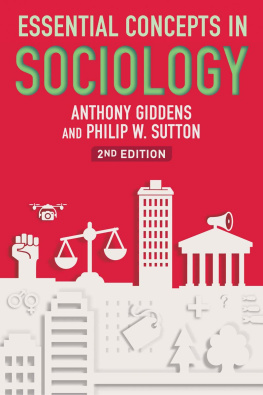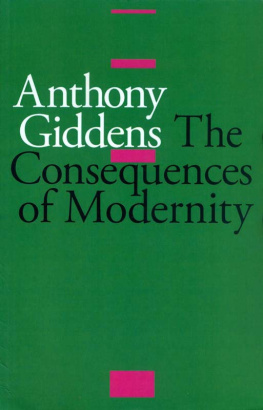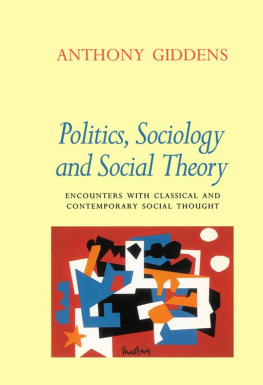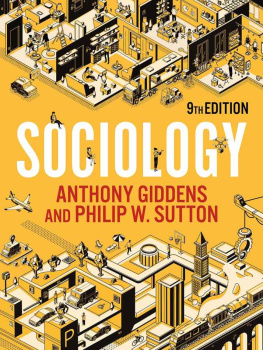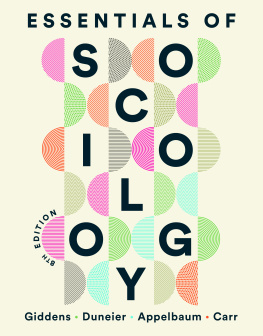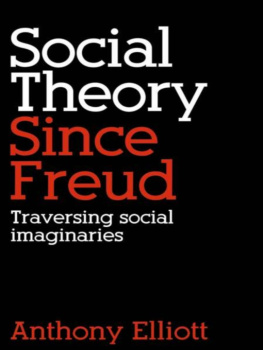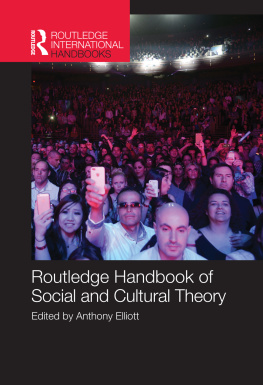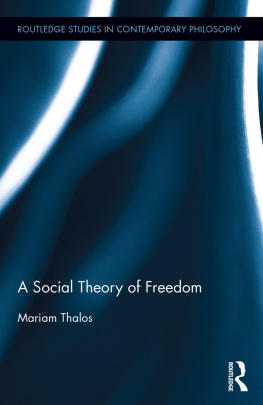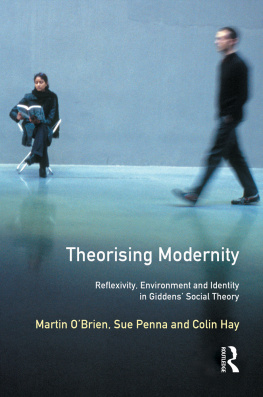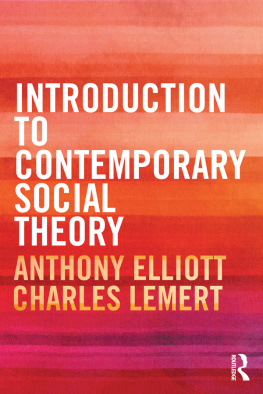ROUTLEDGE LIBRARY EDITIONS:
SOCIAL THEORY
Volume 80
STUDIES IN SOCIAL AND
POLITICAL THEORY
STUDIES IN SOCIAL AND POLITICAL THEORY
ANTHONY GIDDENS
First published in 1977
This edition first published in 2015
by Routledge
2 Park Square, Milton Park, Abingdon, Oxon, OX14 4RN
and by Routledge
711 Third Avenue, New York, NY 10017
Routledge is an imprint of the Taylor & Francis Group, an informa business
1977 Anthony Giddens
All rights reserved. No part of this book may be reprinted or reproduced or utilised in any form or by any electronic, mechanical, or other means, now known or hereafter invented, including photocopying and recording, or in any information storage or retrieval system, without permission in writing from the publishers.
Trademark notice: Product or corporate names may be trademarks or registered trademarks, and are used only for identification and explanation without intent to infringe.
British Library Cataloguing in Publication Data
A catalogue record for this book is available from the British Library
ISBN: 978-0-415-72731-0 (Set)
eISBN: 978-1-315-76997-4 (Set)
ISBN: 978-1-138-78603-5 (Volume 80)
eISBN: 978-1-315-76322-4 (Volume 80)
Publishers Note
The publisher has gone to great lengths to ensure the quality of this reprint but points out that some imperfections in the original copies may be apparent.
Disclaimer
The publisher has made every effort to trace copyright holders and would welcome correspondence from those they have been unable to trace.
Studies in Social and
Political Theory
Anthony Giddens
Hutchinson of London
Hutchinson & Co (Publishers) Ltd
3 Fitzroy Square, London W1P 6JD
London Melbourne Sydney Auckland
Wellington Johannesburg and agencies
throughout the world
First published 1977
Paperback edition 1979
Anthony Giddens 1977
Set in Intertype Times
Printed in Great Britain by The Anchor Press Ltd
and bound by Wm Brendon & Son Ltd
both of Tiptree, Essex
ISBN 0 09 129201 8
Contents
Virtually all of the essays that appear below were written over the past seven or eight years, in conjunction with a number of larger works.* They range over a fairly wide diversity of topics but, as is indicated in the Introduction, they are unified by a concern with a limited number of central problems in the social sciences. Seven of the chapters are followed by fresh appendices. I have written these in order to extend or amplify arguments developed in the main part of the text, and to help to tie together the overall themes of the book. I do not of course claim that these represent comprehensive treatments of the points they raise.
*Capitalism and Modern Social Theory, Cambridge University Press, 1971; Politics and Sociology in the Thought of Max Weber, Macmillan, London, and Humanities Press, New York, 1972; Emile Durkheim: Selected Writings, Cambridge University Press, 1972; The Class Structure of the Advanced Societies, Hutchinson, London, and Basic Books, New York, 1974; New Rules of Sociological Method, Hutchinson, London, and Basic Books, New York, 1976.
The studies which compose this volume are essentially organized about a critical encounter with European social theory in its classical period i.e. from the middle years of the nineteenth century until the First World War and have the aim of working out some of the implications of that encounter for the position and prospects of the social sciences today. The issues involved can be classified broadly under four headings, as relating to the following series of problems: method and epistemology; social development and transformation; the origins of sociology in nineteenth-century social theory; and the status of social science as critique.
Problems of method and epistemology
At the cost of some considerable oversimplification, and with the partial exception of the tradition of the Geisteswissenschaften in Germany, it is true to say that nineteenth-century social thought was dominated by the ambition of duplicating, in the sphere of human social life, the successes of physical science in mastering nature intellectually and materially. Nothing exemplifies this outlook more clearly than Comtes hierarchy of the sciences, which both explains the relation between the various sciences, natural and social, and offers an account of the tardy arrival of social physics on the scientific scene. The positive spirit first develops in relation to phenomena of the most general kind, far removed from human control: the objects and events studied in astronomy and physics. From these beginnings science progressively conquers the other realms of nature, moving through the chemical and the biological, to human social conduct itself; sociology is the last in the hierarchy of the sciences to come into being, because mans own social behaviour is the most difficult for him to subject to the objective scrutiny of science.
Comtes positive philosophy has three particular features to
The presumption that the social sciences have a revelatory character directly akin to that of natural science depends upon the view that common-sense or lay beliefs are in principle corrigible in the light of scientific findings. In Comtes writing, this appears in the form of an incompatibility between theological and metaphysical thought on the one hand, and the method of the positive sciences on the other. The task of scientific investigation, whether of nature or of society, is one of demystification, the replacement of tradition and prejudice by empirically verified knowledge. Such a view, even purely within the realm of natural science, as Husserl demonstrates in The Crisis of the European Sciences, conceals unexplicated premises concerning experience or the empirical: the lebensweltliche a priori. Positive thought supposedly provides a medium for the principled corrigibility of the world of lay beliefs or the natural attitude, but actually accepts implicitly some fundamental elements of the natural attitude which remain concealed and therefore unexplicated.
Let us move to the second point mentioned previously, the relation between theories and facts. In recent times, i.e. in the post-positivistic philosophy of natural science that has come to the fore in the past two decades or so, certain basic characteristics of the empirical character of science have been made clear. One is that even in the most developed areas of the natural sciences, theories are underdetermined by facts; another is that all observation statements are theory-impregnated. The implications of these for the natural sciences are controversial, as the continuing debates among philosophers of science show. More important to this volume are the consequences for the logic and method of the social sciences. These, I consider, are as follows: 1) The underdetermination of theories by facts in social science is certainly greater than in natural science. This is one factor (not the only one) explaining the lack of paradigms in the social sciences, the phenomenon which was a stimulus to Kuhns reflections in The Structure of Scientific Revolutions. as: the relative absence of controlled experimentation, the intractability of materials to scalar measurement, and problems of accurate replication. Of course, the natural sciences also differ between themselves in respect of such characteristics. 2) The theory-laden character of observation-statements in natural sciences entails that the meaning of scientific concepts is tied-in to the meaning of other terms in a theoretical network; moving between theories or paradigms involves hermeneutic tasks. The social sciences, however, imply not only this single level of hermeneutic problems, involved in the theoretical metalanguage, but a double hermeneutic, because social-scientific theories concern a pre-interpreted world of lay meanings. There is a two-way connection between the language of social science and ordinary language. The former cannot ignore the categories used by laymen in the practical organization of social life; but on the other hand, the concepts of social science may also be taken over and applied by laymen as elements of their conduct. Rather than treating the latter as something to be avoided or minimized as far as possible, as inimical to the interests of prediction, we should understand it as integral to the subject-subject relation involved in the social sciences.



